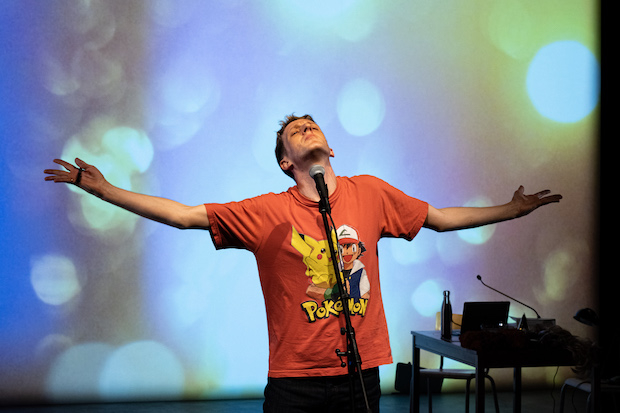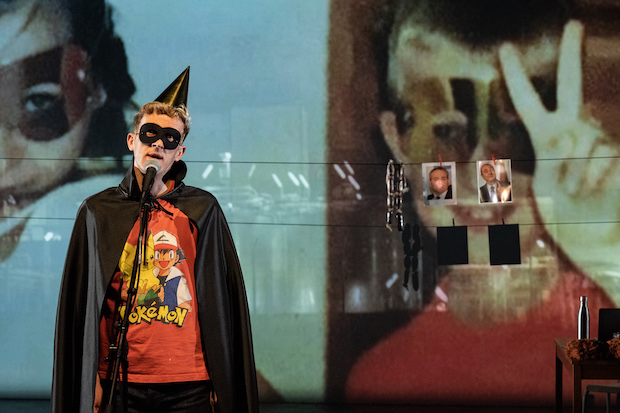Review: Édouard Louis's Who Killed My Father Indicts the Entire French Political Class
The bestselling author’s solo show makes its US debut in Brooklyn.

(© Teddy Wolff)
The title of Édouard Louis's third book, Who Killed My Father is a bit premature. Legally speaking, Louis's father is still very much alive, albeit suffering from myriad ailments resulting from an industrial accident, a poor diet, and a return to physical labor forced onto him by successive French governments under the guise of austerity.
And yet, the evidence Louis presents in his investigation of the forces killing his father's body suggests a systematic spiritual deadening that began decades ago. This is wrenchingly clear in the stage adaptation of Who Killed My Father, which is now making its US debut at St. Ann's Warehouse. Developed with Schaubühne Berlin and Théâtre de la Ville Paris, and performed in French (with English subtitles) by the author himself, it stubbornly resists any attempt to draft its message into the culture war.
That's the first, and perhaps most important triumph of this strained and occasionally strange solo show, which will win no acclaim for its revolutionary stagecraft. Louis is the bestselling author of The End of Eddy and History of Violence, memoirs about the hell of growing up gay in a small town (which included plenty of torment from the author's own family) and the demons lurking in the big city once he escaped there. He is not a natural performer, delivering much of the show in a calm-verging-on-monotonous cadence. Long monologues are directed at an empty leather armchair (designer Nina Wetzel has smartly selected the perfect set piece to convey an absent father). In Louis's frequent pregnant pauses, you can almost hear the therapist, notepad in hand, prodding, If your father were here right now, what would you say to him?
Louis and director Thomas Ostermeier attempt to break up this text with lip-synch performances of "Barbie Girl," "…Baby One More Time," and "My Heart Will Go On" (cultural touchstones for gay millennials the world over). Unfortunately, these are hampered by Louis's limited menu of dance moves, and like Celine's heart, they go on (and on and on). One suspects that RuPaul would immediately ask him to sashay away.

(© Teddy Wolff)
But in these moments, we can see Louis attempting (and succeeding) to re-create the awkward childhood performances that sent his father fleeing the house to chain smoke, embarrassed by his flamboyantly gay son. Would he have felt this way if we lived in a society that tolerated a wider range of male expression? An unearthed photograph of dad in his early 30s, dressed in drag and looking genuinely happy, suggests that this attitude is not innate, but learned.
When you live in a world that expects men to provide, but simultaneously teaches boys that academic success is girly (thereby discouraging from a young age the path that would lead to the safest, most remunerative jobs) you get a story like this one — which is about one man choosing the path of least resistance and being punished for it. The dominant culture has little to say about this beyond a liberal morality tale that disguises brutal classism as meritocracy — in which the virtuous bourgeoisie triumphs over the working-class hicks, who are so addicted to hate, they are literally killing themselves. Who Killed My Father is a powerful corrective to that big lie.
These issues were addressed with more academic rigor in Didier Eribon's Returning to Reims (which also played St. Ann's under the direction of Ostermeier). While that production was sleek and slightly cold in its provocations, Who Killed My Father leads with emotion, making the political feel deeply personal as Louis unpacks how his father became a dangerously unhealthy and broken man by his early 50s.
At one point, Louis switches to English to confess his role in a family conflict that he provoked as a means of revenge for a hateful comment his mother made, as if the language barrier could protect him all these years later. As the play progresses, Louis's even-keeled delivery begins to look like something other than bad acting: This is a man who refuses to abandon empathy for cheap anger — even when the algorithms of our modern culture reward the latter.

(© Teddy Wolff)
The one place where anger breaks through is in the final passage: Dressed inexplicably like a bandit wizard (costumes by Caroline Tavernier), he indicts multiple French politicians from three different parties (nearly all products les grandes écoles), hanging their portraits on a clothesline as he draws a direct line from their policies to his father's bodily degeneration. He throws bang snaps below their images, which crackle with rage even when his voice does not. I still feel that rage in my throat, because if you think the blinkered Ivy grads who run everything in this country are any better, you're delusional.
Here is where I ought to make my own confession as to why Who Killed My Father moved me on a personal level: As the gay son of a macho father who actually did die in his mid-50s, just as we had reached a détente following the wars of my adolescence, I reflexively feel the pain Louis is trying to convey. The tragedy of a death like that is that it forecloses the possibility of the relationship developing any further, so that you're mostly left with hurtful memories of the past. Even if his father is still alive, Louis's outrage at this theft of time is completely justified.









